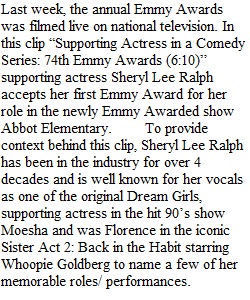


Q Instructions This assignment is the same as media assignment #1 and #2, but you'll select a different media example to analyze and different course content to use in your analysis. Media Analysis Assignment Instructions MBA 506: Leadership, Teams, and Communications Overview: These short assignments are structured the same as your leader interview course paper, and will help you develop your analysis skills. For each media analysis assignment, you will find a new example of leadership and teams in the media, such as magazines, newspapers, YouTube, internet stories, tv or movie clips, blogs, etc. The purpose of this paper is as follows: • Practice analytical thinking. See how teams and leaders are discussed in an applied setting and consider whether these examples are consistent with how they are presented in class and readings. • Develop communication skills for a business audience. Practice concise writing skills that you will use for your leadership interview course paper. • Apply concepts learned in the course. Your paper should demonstrate an in depth understanding of the course materials. Use only new media examples: The goal is to analyze current events. Your reference must have been published no more than one month before the assignment deadline. You will have three of these media analysis assignments, and you should choose a different current event for each one. What kind of media can you analyze? The options are very broad, and you will be graded much more on your analysis than the media you choose. You must include a functional link to the source to receive credit. Here are some examples of media other students have used successfully. Please don’t use any of these specific stories for your assignment, but feel free to use the same sources: • News stories, either written or video content, such as this story about Tesla’s Elon Musk as an example of leader mistakes: https://www.huffpost.com/entry/sec-elon-musk-contempt-tweets_n_5c913947e4b09b8d563a36ca • Podcasts, such as Bumble founder Whitney Wolfe interviewed on the How I Built This Podcast: https://www.npr.org/player/embed/712909267/714430808 • Blogs, such as this Center for Creative Leadership article describing how an executive learned charisma: https://www.ccl.org/blog/charisma-innate-can-executives-learn/ • Movie or TV show clips, such as this example of inspirational leadership from We Are Marshall’s pre-game speech: http://www.youtube.com/watch?v=RzToNo7A-94 • Commercials, such as this example of coercive power from Terry Tate, Office Linebacker: http://www.youtube.com/watch?v=RzToNo7A-94 • Online videos, such as this interview with Mary Barra, CEO of General Motors, on ethics: https://www.youtube.com/watch?v=Qf-pgjxkOrk Analyze Using Class Content: Find examples that are relevant to the course work that we have covered in class and readings so far. If you find an example for a future week’s topic, save it and turn it in that week. A major part of the assignment is to show your understanding of the course content and readings, and to be able to apply them in the analysis of your example. Submission: Due dates are provided on the syllabus. All media assignments are due via Brightspace, and no paper copies will be accepted. Late assignments will not be accepted for any reason, but I will drop your two lowest scores on all assignments in the participation category (see syllabus). Grading (10 points total): • Situation summary (1 point): Include a short (five sentences or less) summary of the situation described in your media example. • Analysis (4 points): Describe how your media example relates to a theory, approach, or other content discussed in class or in the readings. Use at least TWO different concepts from class and highlight those words in bold. Be very specific to show you understand the material. For example, how is your clip an example of reward power? Is the reward power effective in this case? Give enough of a description to make it clear that you understand the difference between reward power and other sources of power. “This is an ineffective use of reward power because cookies are not very strong incentives for followers. According to Raven (1993), followers are more likely to…” • Recommendation (3 points): Provide a specific, behavioral recommendation for how to improve the effectiveness of the leader or others in this context. • Format, source, references (2 points): Your paper text should be no more than two pages double spaced. Include a hyperlink to your media source and your full name at the top of the page. In addition, please include APA style in-text reference with author and year of the research sources you used (from readings or class). You do not need to include a full reference list at the end of the assignment, but you will need to do this for your leader interview paper in the future. See Brightspace for examples of APA references and in-text citations.
View Related Questions